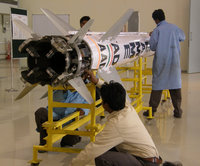In secretary-level talks between India and Pakistan that concluded in Islamabad on June 25, the two nations decided to set their differences aside and work toward a new future. But even as both sides reassess their ties and mull confidence-building measures, the thorny issue of tactical and strategic missile tests and ballistic missile defense (BMD) continues to cast a long shadow over the bilateral relationship.
Recent reports that India is seeking to develop longer-range strategic missiles have raised anxieties in Pakistan. On June 2, the head of Defense Research and Development Organization (DRDO), India's premier defense-research agency, declared that India would test the Agni V, a ballistic missile with a 3,100-mile range, by the end of 2011. The announcement, which followed a call by Defense Minister A.K. Antony to expedite the development of the missile system, is significant, as the Agni V represents a potent capability: It is designed to carry multiple independently targetable re-entry vehicles, giving it the ability to deliver multiple warheads to different targets.
Currently, India has only one intermediate-range ballistic missile, the Agni III, whose 1,864-mile range makes it capable of striking some targets inside China. But to bring bigger cities within striking distance, India needs to develop a missile system with a longer range. In May, after the Indian Nuclear Command Authority reviewed the progress of the country's long-range missiles, a decision was reportedly taken to speed up development of the Agni V. New Delhi asserts that it is critical for the nation to develop a credible posture of deterrence against both China and Pakistan. But Islamabad alleges that New Delhi is simply attempting to enhance its nuclear capabilities, adversely affecting Pakistan's own nuclear deterrent.

